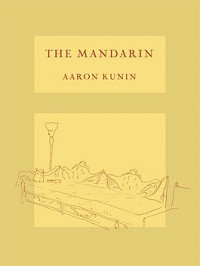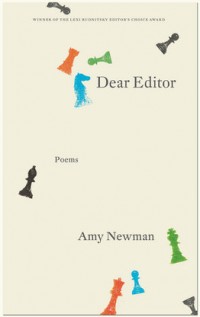25 Points: The Mandarin
 The Mandarin
The Mandarin
by Aaron Kunin
Fence Books, 2008
209 pages / $17.95 buy from Fence
1) Language is a form of disobedience.
2) Or: words have no loyalty. Or: language facilitates perversity. Or: to speak is to be reminded of language’s inescapable techné. Or: to employ language is to court malfunction. Or: to write is to run the risk of making more sense than you ever intended. Or: language is always on the cusp of being carried away. Or: talking is almost always talking back. Or: language was designed in emulation of water, a force, a flow without shape but the rare ability to hunt direction down and wear it out. Or: nothing could be more nonsensical than if our every utterance were understood literally. Or: you teach a child to say “no” at your own peril; those early “no“‘s are no ventriloquism act. Or: the so-called precise word is precisely that, so-called, a chimera. Or: to speak is to confuse irrevocably the matter of whether one is announcing something before it happens, or whether one is announcing something as a way of compelling its presence to coincide with its occurrence.
3) Aaron Kunin’s novel The Mandarin is a self-conscious (perhaps even sentient) construction of language, some phenomena I wish to differentiate from the notion of a linguistic construction… For I want the suggest that The Mandarin is more like a self-organizing discourse than it is a “work” composed-slash-authored. The Mandarin is thus less a novel as commonly defined in terms of “long story” than it is an exercise in novel-ese, or the novel as style. This is not to say that either text or author fail in any way to fully realize whatever metaphysical potential is latent in the novel-as-form. Rather, what I want to claim for this book is that it is a brilliant, occasionally scathing, yet ultimately poignant tribute to the inherent limitations of an imagination whose eide and eidola alike are utterly—dimensionally—verbal.
4) Or: The Mandarin is an exceptionally manneristic “novel of manners.”
5) Or: if you squint at it in the proper way, this is a conceptual novel. Kunin supplies a 3-page synopsis that you need not read past, excepting you wish to satisfy your curiosity regarding the novel’s execution. Quoted in full, however, I find that this explanation is just a scheme for disclosing a question that, in order to be dramatic, cannot remain undisclosed; that is, must be secret, only formerly. Is this synopsis a lie?
6) In a sense, the book is naming itself every time one look at its cover or spine, insisting that it has to remind you that it is a novel, a book that has to be taken “seriously.” And, as much as this title’s prodding is about a kind of salesmanship, the relationship between word and world is more suspect than that. Most “things” can’t speak the way a book can, nor do they suffer the arc of the Lomans. (The main character and narrator upon whom Kunin depends is a Willy.)
7) And what is a mandarin anyway? A living etymology, thus a kind of fossil, a word that survives despite going largely unused; a museum exhibit that does not have to be put on wheels because it installs itself everywhere around you the moment you decide to judge it into being. (And every time you recall Henry James.). Mandarin: it’s a pejorative, and what makes our mandarins so worthy of disdain—and so funny—is the complete un-self-consciousness (rather: blind narcissism) of the pose. Such is pedantry, this trying-so-hard-all-you-do-is-drown-flailing-in-gelatinous-effort. Even if taken as an adjective, “mandarin” is a point-of-view compact in its three syllables. An evaluation, and a coping with something which looks familiar but which we, uttering, would like to believe has naught to do with us or our position. But the use of a term like this is a power-play: it elevates us, uttering, to some superior vantage from which we can describe a sham noble. And phoniness makes of such rare essence the cheapest cardboard: what a noun like “elitism” names, just as that The here qualifies and specifies. So I think.
8) As one reads, one discovers that The Mandarin is a novel-in-conversation, but it could not be more different in tone and (apparent) intent than similar “experiments” such as Duras’ The Square or Gaddis’ JR, to take but two examples. For the exchanges here do not move toward revelation via vaguely Socratic gestures; unlike The Square, very little is asked in The Mandarin. Instead, much is pronounced. But neither does the narrator evince an obsessive’s commitment to “how people really talk”, the kind of photorealistic prose that, in Gaddis, turns everything into plastic and a kind of dense, you’ll-knock-your-knee-or-elbow-against-it nausea.
9) Rather, Kunin, through careful application of a few linguistic effects, seems to be after a parody of novelistic prosody. Example: here are “characters” who speak without relying on contractions.
Perhaps it is not so much that contractions are absent here, absence in this instance implying a forgetting, or a negligence: a grammar active, but only in the form of exiting / having left the stage. Rather, the contractions feel avoided. They have been deliberately excluded, so long as the characters retain control of their emotions or do slip from the perch of their poses.
10) Grammar is being acted upon. All of which reinforces or superimposes again, needlessly, the presence of authors, narrators and characters (the narrator, Willy, writes novels that may also be soporifics), the last two of which are authors manqué anyway. READ MORE >
December 13th, 2012 / 1:01 pm
Oh those sexy Asian movies
I am looking for a movie I once saw. I’ll describe it as best I can remember.
It is an Asian movie.
Do you enjoy keeping your opinions to yourself and being seen but not heard? Have you been looking to de-prioritize parts of your life like “family obligations, writing, involvement with other organizations, degrees to be finished, holidays to be taken, [and] weddings to attend in Rio”? Looking to earn a low-level salary while living in fear of “immediate dismissal” if you don’t answer emails fast enough on a Saturday night? Well then, apply now for a job at Dalkey Archive Press!
“A Botanist considers the coconut one-seeded drupe (aka: dry drupe)”
 One thing I can recommend without even needing a kickback is coconut milk ice cream. It’s pretty easy to make on your own, it’s good if you don’t eat dairy for whyever, some companies that make it have hilarious videos of their hippie-ass founders on their websites, and one time on the phone with Comcast I actually bonded with the person from Comcast over it, over coconut milk ice cream. Another thing I can recommend is Coconut #15, the newest issue of an online poetry magazine, which is back after a hiatus. Way back in 2005, I used to get Coconut mixed up with Shampoo, so now you know whether you would ever want to take a shower with me.
One thing I can recommend without even needing a kickback is coconut milk ice cream. It’s pretty easy to make on your own, it’s good if you don’t eat dairy for whyever, some companies that make it have hilarious videos of their hippie-ass founders on their websites, and one time on the phone with Comcast I actually bonded with the person from Comcast over it, over coconut milk ice cream. Another thing I can recommend is Coconut #15, the newest issue of an online poetry magazine, which is back after a hiatus. Way back in 2005, I used to get Coconut mixed up with Shampoo, so now you know whether you would ever want to take a shower with me.
I don’t get Coconut #15 mixed up with anything, which is because the old old old universe is shaped like a saddle. And also because my love for you is not a coin operated washer/drier or that type of orgasm (Spectateur, -trice, n) that watches you, as if from above. Instead I am a vibration as hard as a living creature, and I am always on the lookout for officers of light. Instead I keep finding “history” in mornings and quotation marks. The prisoners keep hitchhiking and waving soap box guns. You keep puking in your mother’s mouth, which doesn’t help Dorothea any, because she already expects all the witches. Galaxy-sheep can count every time they’ve cried in a hole in the wall piano bar. They know they don’t need to count anything to know that everyone’s a hero or fooled you. Imagine sleeping in a canoe or as a toy whale in a gutter. Now imagine everybody as a  feather on a child with a bird’s head. If that feels annoying, let your eyes wander to water. Try to understand those kids who hide in abandoned refrigerators and want shoulder blades to replace knives. If you are lucky you’ll be able to see the turnip fields from here, glowing and torpedoed from the rain. You’ll see yourself downing your fourth energy drink and hating how not tired you are. People who play video games don’t sleep. People who don’t sleep watch commercials. Don’t comfort it out in the middle there. We will absorb these rules like a saltbath. We check out the list of demands and it’s filled with things we like but never used to like. In what you once famously referred to as my earlier, bullshit life, the clock on the bed and the white horse sad as the island both failed to tell me what time it is because time is a mirror made wrong. How many times have you wandered beneath the dark only to emerge into darker? I don’t know about you, but I don’t want my cloud to understand anything. You tell yourself your bones are too fat to fly and a tree tells you otherwise. The tree tells you it was beautiful to hold boys who wanted to make girlfriends out of paper or stones, and the fiddlehead fern—with gunshots of light in the leaves?—it high-fives you in your face.
feather on a child with a bird’s head. If that feels annoying, let your eyes wander to water. Try to understand those kids who hide in abandoned refrigerators and want shoulder blades to replace knives. If you are lucky you’ll be able to see the turnip fields from here, glowing and torpedoed from the rain. You’ll see yourself downing your fourth energy drink and hating how not tired you are. People who play video games don’t sleep. People who don’t sleep watch commercials. Don’t comfort it out in the middle there. We will absorb these rules like a saltbath. We check out the list of demands and it’s filled with things we like but never used to like. In what you once famously referred to as my earlier, bullshit life, the clock on the bed and the white horse sad as the island both failed to tell me what time it is because time is a mirror made wrong. How many times have you wandered beneath the dark only to emerge into darker? I don’t know about you, but I don’t want my cloud to understand anything. You tell yourself your bones are too fat to fly and a tree tells you otherwise. The tree tells you it was beautiful to hold boys who wanted to make girlfriends out of paper or stones, and the fiddlehead fern—with gunshots of light in the leaves?—it high-fives you in your face.
Critical Analyses of Big L’s Most Sexually-Charged Lines
“Talkin’ bout ‘rhyme for me, L.’ Man, fuck rhymin’, cos my dick is hard enough to cut diamonds.” Clinic (Shoulda Worn a Rubber)
The diamond is commonly known one of the hardest materials on earth found in any natural deposits. I think lately people have engineered or found stuff that’s harder, but for argument’s sake let’s say the ‘diamond’ is the hardest material known to man. Big L is experiencing such a heightened state of arousal that his cock is now hard enough to cut through the hardest material known to man. Unbeknownst to the listener is whether L himself ever used said member to copulate with the pursued female partner, Joelle, earlier in the storyline. If he did, she almost certainly suffered terrible wounds and lacerations and has since been rendered unable to conceive, let alone experience a true orgasm. It truly makes one wonder about how far rappers are pushed to perform sexually by fans and “groupies” and whether L’s insatiable demon peen didn’t in some way lead to his demise. (He was shot, right? Maybe his diamond-esque sword in some way became magnetic to bullets? One can never be certain about these things.)
P.S. Big L does not want to “rhyme” for Joelle because unfortunately he’s become terribly preoccupied by anything but sex and hence will not be able to do or think about anything but until satisfaction has been reached.
“I knocked the boots from New York to Santa Fe, and that bitch burnt me like a gamma ray.” Same song, later on.
Now here L has set aside his scruples and become cantankerous in the face of a sexually transmitted disease, and though his previous chivalry has put him into this situation with Joelle, it’s now been cast aside in disgust due to that pesky predator, “Gonorrhea.” However, it seems prudent to note L’s ability to boast about knocking “the boots from New York to Santa Fe,” and admit with full candor in the following stanza that he was “burnt like a gamma ray.” Such emotional honesty balanced against stoic egotism has assuredly not been felt since Norman Mailer’s Advertisements For Myself and here we not only have the author’s pants down showcasing his manhood in all its infected glory, we have a protagonist so afflicted by circumstance that the only response he can summon up is a quick, Shakespearean revenge plot. L asserts, “Yo I’mma kill that bitch, next time that I see her,” and it’s not since the Bard that two star-crossed lovers were faced with such unfortunate miseries.
“Fuck around you’ll find my silk boxers in your mother’s hamper.”
Big L & Jay Z Freestyle
Here we return to the themes of old in which the young, spry Big L feels certain that if anyone should have the gall to challenge him or affront his person in anyway, he’ll bed their mother almost instantly. So instantly, in fact, that the proverbial you—a young man equally spry though perhaps not quite as sharp, and what’s more you often dig through your mother’s hamper (?)—will soon find L’s “silk boxers in your mother’s hamper.” This is the ultimate revenge story because the tragedy for the victim occurs long after the fact. Will you walk in on L with his hands cascading anxiously over your mother’s supple flesh? Will you see them at Denny’s late one night after seeing Liam Neeson’s newest picture? No. You will be left to stew in ignorance and curiosity as to whether these boxers, silken and inscribed with the man’s name, could possibly have reached your mother’s hamper through the depraved acts of which you dare not speak. READ MORE >
A Lot — Basically All — Gay People are Normal and Don’t Deserve Any Special Attention Whatsoever
 Queer Eye for the Straight Guy and Newlyweds were kind of popular shows on the telly when I came to the conclusion that if I were to ever do that disgusting activity that you should probably never do it would be with a boy.
Queer Eye for the Straight Guy and Newlyweds were kind of popular shows on the telly when I came to the conclusion that if I were to ever do that disgusting activity that you should probably never do it would be with a boy.
Sometimes, while flipping through the trillions of telly channels, I would stop on Queer Eye. The snippets that I saw of the “queer eyes” turned and twisted my tummy terribly. They had lots of product in their hair, wore insufferably strange trousers, and, just in general, looked as if they had spent the last gazillion hours scrubbing themselves in a shower stall. All these boys seemed to care about was their bodies. They didn’t watch PG movies or collect teddy bears or commit French poetry to memory. Their primary concern was the appearance of their flesh as well as the flesh of the straight guys that they were making over.
Straight people are just as corporeal as gays. Nick Lachey is a straight boy. He sort of has massive muscles and wears product in his hair. Whenever I saw Nick on the Newlyweds, I said to myself, “I do not want to be like this boy. I want to be like Jessica!” Jessica was quirky and inquisitive. She was thoughtful about that which she interacted with. She asked questions, like why a tuna fish company would name themselves Chicken of the Sea. Nick seemed unable and unwilling to string sentences together. But Jessica was a cute chatterbox, like Anne Frank when she was in school.
THE FEELING OF DIGITAL RELEASE
DO YOU LOG IN HERE OFTEN BUY LINK
***
[Greeting]
Happy Holidays from Erik Stinson and the Sense Europa Team
[Body]
[attached screenshot] [maybe but some holly on it… make it holiday themed]
This is a post to celebrate the release of my fifth book of self-published office hardcore and the release of the equally narcissistic (but highly necessary) digital version of Sense Europa magazine.
Do You Login Here Often? is a book of poetry addressing _______(_._)________ . Scroll to the bottom of this post to view the trailer for the book, which was directed by the smooth, modern, and enigmatic Adam Humphreys (Shitty Youth, 2012 link) , who worked in collaboration with Oakland based coder and web designer Mitch Trale on the unique and embeddable player. To read more about the book go to (link).
Sense Europa is the only European Men’s magazine published in New York City. The third issue features contributions from McLean Gordon, Dod Hamilton, and the inimitable Slash Lovering. It was put together lovingly by myself, Jackie Jackie Chiquoine, Dan Stuckey and IEJ. You can download it here (link).
A retrospective of previous book trailers for my works is live at Adam’s blog.
We hope you enjoy these pre-holiday treats and look forward to a productive and interesting 2013!
25 Points: Dear Editor
 Dear Editor
Dear Editor
by Amy Newman
Persea Books, 2011
80 pages / $15.00 buy from Powell’s
1. Dear Editor contains cover letters from Amy Newman to an unnamed editor or editors, spread across three seasons. Most of the letters follow the typical format of writer correspondence, beginning with the word “please.”
2. Writers are expected to treat editors with professional respect, particularly if that magazines ends with the word Review.
3. The pejorative connotations of the word “submission” have been investigated elsewhere, but Newman revises the process. Submission is a form of prayer. Waiting occurs.
4. Writers need editors. Editors need writers. Some people are both.
5. The manuscript being submitted is titled X = Pawn Capture.
6. Newman does not include any direct poems from this hypothetical collection, and for good reason: the project is contextualized, not concrete. The collection appears to be “a lyrical study of chess,” or not.
7. Saints appear throughout Dear Editor.
8. Saints are abnormal. Such is their beauty.
9. Some saints who appear in this book: Saint Berry (not real), Saint Lucy (real, but the letter writer’s grandmother claimed that, on her wedding day, “Lucy came in and winked behind the altar, stuck out her tongue”). St. Brigid of Ireland. “Isn’t faith a kind of belief that is never satisfied?” Euphrosyne.
10. Is the letter writer Amy Newman? Amy Newman signs the letters. Her name is on the front of the book. READ MORE >
December 11th, 2012 / 12:09 pm

